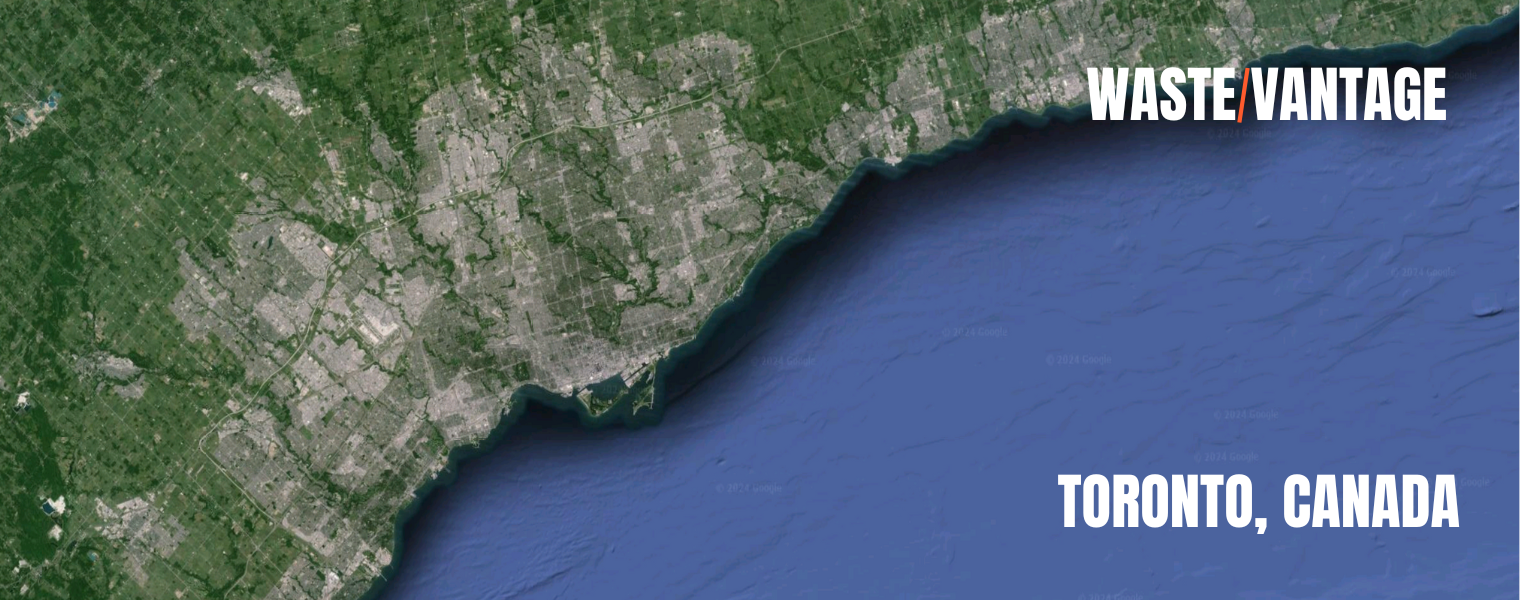WasteVantage City View
Toronto, Canada

Carbon Emissions
5.6 MT/Capita
Water Usage
329 L/Capita.Day
Public Transport Usage
23% of Population
Cycling Infrastructure
69 km/100,000 People
Electric Vehicle Adoption
3.2% of Total Cars
Green Building Certification
22% of Total Buildings
Urban Heat Island Effect
4°C Above Rural Areas
Renewable Energy Usage
21% of Total Energy
Air Quality Index (AQI)
15
Waste Recycling Rate
53% of Total Waste
Green Spaces
12% of Total Area
Energy Efficiency
14,100 kWh/Capita
Biodiversity Index
0.7
Social Equity Index
0.85
TORONTO, CANADA
Embracing Sustainability: Toronto's Journey Towards a Greener Future
Toronto, a bustling metropolis known for its diverse culture and vibrant economy, is emerging as a leader in sustainability. As the city grapples with the challenges of urbanization, climate change, and environmental degradation, Toronto is embracing a path toward a greener, more sustainable future. This transformation is fueled by a combination of government initiatives, corporate efforts, and a growing public awareness of sustainability issues.

Government and Municipal Initiatives
The City of Toronto has been proactive in implementing policies and programs to reduce its environmental footprint and promote sustainability. One of the key initiatives is the TransformTO plan, which aims to reduce greenhouse gas emissions by 80% by 2050. The plan focuses on enhancing energy efficiency in buildings, expanding public transportation, and promoting renewable energy sources.
Toronto’s government is also investing in green infrastructure, such as expanding urban green spaces, developing cycling lanes, and supporting electric vehicle adoption. The introduction of the Toronto Green Standard, which mandates sustainability performance measures for new developments, exemplifies the city’s commitment to integrating sustainable practices into urban planning.
Public Sentiments and Understanding of Sustainability
Torontonians are increasingly aware of the importance of sustainability and are eager to contribute to a more sustainable future. Public sentiment reflects a strong desire for cleaner air, accessible green spaces, and a robust public transport system that reduces dependency on personal vehicles.
A recent survey conducted by the Toronto Environmental Alliance revealed that a significant majority of residents prioritize sustainability and support initiatives to reduce waste, improve air quality, and combat climate change. This growing awareness is driving demand for sustainable products and services, pushing businesses to align with the city’s environmental goals.
Corporate Efforts in Sustainability
Local brands and businesses in Toronto are responding to the sustainability call by adopting eco-friendly practices and offering sustainable products. Companies like Loblaws, Canada’s largest food retailer, are working to reduce plastic waste by introducing reusable bags and packaging. Meanwhile, Toronto-based fashion brands are increasingly adopting sustainable materials and ethical production methods to cater to the eco-conscious consumer.
The rise of social enterprises and start-ups focused on sustainability, such as Loop and Bullfrog Power, illustrates the entrepreneurial spirit driving Toronto’s green economy. These businesses are innovating solutions to reduce waste, improve energy efficiency, and promote a circular economy, contributing to Toronto’s reputation as a hub for green innovation.
Innovation & Growth
Toronto supports the growth of businesses that prioritize sustainability, driving innovation and creating a thriving eco-friendly economy.
Community & Environment
The city is enhancing urban landscapes by increasing green spaces, which improve air quality and provide recreational areas for communities.
Energy Efficiency
Toronto implements energy-saving technologies and practices, aiming to reduce emissions and promote a sustainable lifestyle for its residents.
Leadership & Influence
Toronto leads the charge in sustainability, setting benchmarks for other cities and inspiring nationwide environmental policies.
Cause for Concern
The Urgency of Action
The call for immediate action on sustainability in Toronto is clear and critical. With the impacts of climate change becoming more evident, such as extreme weather events and rising temperatures, the need for sustainable practices is more pressing than ever. Failure to act now could result in significant economic, social, and environmental consequences for the city.
Climate change-related risks include increased flooding, heatwaves, and air pollution, which threaten the health and well-being of Toronto’s residents. The economic costs of inaction could be substantial, affecting industries such as real estate, insurance, and agriculture. Socially, the most vulnerable communities may bear the brunt of these impacts, exacerbating existing inequalities.
Next Steps
The Path Forward
For Toronto, embracing sustainability is not just an option; it is a necessity. As the city continues to grow, adopting sustainable practices will be crucial to maintaining its livability and economic prosperity. The collective efforts of government, businesses, and citizens will be instrumental in creating a resilient and sustainable Toronto that can thrive in the face of future challenges.
By fostering a culture of sustainability, Toronto can set a powerful example for other cities, showcasing the benefits of a green transition. The journey towards sustainability is complex, but with determination and collaboration, Toronto can lead the way to a brighter, greener future for all.
Want to chat?
Looking for advice on building a group-think team or need help with ideas about becoming sustainable? We're happy to help & support you.
Key Pages
Get our monthly mailer
Subscribe to unleash the Green Choices evangelist inside you, now!

